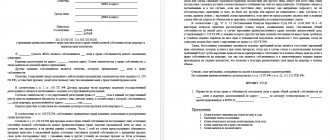What is a donation and a deed of gift?
When a thing or property is transferred free of charge, without requiring payment, from one person to another, this is called the donation procedure.
You can donate anything, from food to transport and real estate.
In most cases, the process is quite simple, but if the gift is an expensive item, you will have to draw up a special gift agreement and conduct a full-fledged transaction.
Good to know: most often this document is required when transferring an apartment or other real estate: thanks to its preparation, the new owner will be able to easily prove ownership.
A gift agreement is an agreement certified by a notary for the transfer of property from one hand to another.
He can be:
- Real: the transfer occurs immediately.
- Consensual: the donor agrees to transfer the property in the future.
The document must indicate exactly what item is being transferred: if it is real estate, then its address, if it is decoration, then special features. A contract concluded for an undefined item (if the text only states “apartment” or “decoration”) cannot be executed.
What are the prohibitions on donation?
Despite the fact that the state does not have the right to specify what to give and to whom, there are still some prohibitions on transfer.
This is mainly due to the high cost of some gifts and anti-corruption efforts.
The prohibitions are governed by Article 572 of the same name of the Civil Code of the Russian Federation.
This is interesting: in Russia it is allowed to formalize the donation procedure orally and negotiate verbally, but only if the gift is no more than 3,000 rubles.
Giving items whose value exceeds 3 thousand rubles is prohibited if:
- The donor is a minor or incompetent citizen, as well as their representatives (they do not have the right to decide for their wards). In the first case, the child’s property can be transferred only with the consent of the guardianship and trusteeship authorities, but you should not count on this: there is hardly any reason to deprive a minor of his things.
- The gift is intended for employees of medical and educational institutions. They can receive simple gifts from family and loved ones, but the patient will not be able to give an expensive gift.
- The recipients are civil servants of the Russian Federation or employees of the Central Bank.
- The gift is transferred to commercial organizations.
Please note: this prohibition does not apply to the giving of gifts in connection with protocol dates or official events.
If the persons listed above receive as a gift property worth more than 3 thousand rubles, it will be considered state or municipal property.
What are the restrictions on donation?
Unlike a prohibition, a restriction does not deny the possibility of donating specific property, but limits the possibility of certain persons.
All cases are listed in Article 576 of the Civil Code of the Russian Federation:
- If the property does not belong to a legal entity, but is only managed by it, it cannot be donated without the consent of the owner. For example, if the owner does not want to manage his plant, he can transfer the right to manage it to the company. The latter has no right to donate this plant, unless the owner himself allows it. To do this, he needs to write a power of attorney.
- If a gift is owned by several people, it can only be given with the consent of all owners. For example, when donating an apartment, it is necessary to obtain the written consent of all people registered in it.
- If we are talking about transferring a debt from one debtor to another, it is necessary to obtain the consent of the creditor. If he does not agree, the transaction will be void. Some rights cannot be transferred. For example, payment of alimony or compensation for harm caused to health.
This is important: the power of attorney must clearly indicate the property, otherwise it will be invalid.
What do these terms mean?
A gift is a two-way transaction in which all responsibility for the transferred property lies with the donor.
The prohibition implies that the property cannot be gifted to a third party for one reason or another. The list of reasons is determined by Art. 575 of the Civil Code of the Russian Federation.
Most often, a ban is imposed if the alienation procedure infringes on the rights of third parties listed in Art. 66 Civil Code of the Russian Federation.
For example, if the donor has a large loan debt, he will not be able to transfer the property into ownership, since such a procedure will infringe on the rights of creditors. The restriction on the deed of gift introduces a number of conditions, subject to which the transaction is still possible.
Restrictions on donations and prohibitions on donations apply only to those gifts whose value is more than 5 minimum wages - otherwise the transfer is considered an ordinary gift and is not regulated by legal norms.
Transactions between commercial organizations
Any exchange of gifts between commercial firms must comply with the above laws.
The most important thing that the donor should remember is the cost of the gift: any gift over 3 thousand rubles is unacceptable.
This is due to possible tax fraud.
You should not try to hide the gift: since expensive gifts will have to draw up a gift agreement, this will not help.
Please note: the transfer of assets from the main company to a subsidiary is possible: this is considered optimization of resources and corresponds to economic goals, not enrichment.
Restrictions and prohibitions - what are the consequences of non-compliance?
If a violation of the law occurred during the donation (for example, property that was subject to prohibition or restriction was donated), the violator will face punishment.
Basically, it is limited to the annulment of the donation, that is, the contract is declared invalid.
As a result of the cancellation of the transaction, the gift is mainly returned in the form in which it was at the time of application.
It is worth considering: anyone can go to court: the trustee, the second owner of the transferred property, the creditor, if the donor is the debtor.
If the property owners suffered losses due to the donation, they can demand compensation in full from the funds of the perpetrator. If the gift was common property, the second owner cannot get it back, but can demand compensation from the donor for damages.
The following cases are worth considering separately:
- Fictitious transaction or imaginary: it is regulated by Article 167 of the Civil Code of the Russian Federation.
- A sham transaction or cover for other motives: for example, transferring funds as a bribe. Regulated by Article 170 of the Civil Code of the Russian Federation.
If a bribe is detected, the punishment will be appropriate.
It is important to know: if the gift agreement was concluded orally, in words, but the law requires it to be in writing, such an omission will have negative consequences.
Form of gift agreement
Art. 574 of the Civil Code of the Russian Federation provides provisions regarding the form of the gift agreement, made both orally and in writing . It can be performed orally in all cases except those indicated below:
- organizations that make a gift worth more than three thousand rubles act as a donor;
- under a gift agreement, the gift will be made in the future.
If in the situations described, the contract is concluded only verbally, it is invalid .
The donation itself can occur by transferring property, a symbol (car keys) or title documents to the donee. When donating real estate, the agreement is subject to state registration if it was concluded before March 1, 2013 (in accordance with Federal Law 30.12.2012 N 302-FZ).
Is it possible to refuse to execute a gift agreement?
Unlike many agreements, a gift agreement cannot simply be canceled: the donor must remember that he is giving away the property completely and completely.
He can sell it, exchange it, give it away. However, the parties can indicate in the contract all the conditions for cancellation or return, then the situation will be controlled by them.
For example, in the event of the death of the recipient, the donor can return the gift if it was intended specifically for a specific person.
Please note: usually the refusal procedure applies to a consensual contract, that is, concluded for the future. For example, this includes documents promising a gift after graduation from school or university.
There are several other conditions for refusal:
- After the conclusion of the contract, the financial, family or other condition of the donor deteriorated significantly, which made it impossible to fulfill the conditions. For example, after promising to give their daughter an apartment, the couple suddenly divorced and divided it in half. If the father had known about this, he would not have entered into the agreement.
- The recipient committed a crime against the donor or his family: he tried to kill, rob, beat. If the court finds the recipient guilty, this decision will be enough to cancel. In this case, the degree of guilt does not play any role.
- The recipient may refuse the gift for his own reasons until he actually receives it. For example, due to lack of money to pay taxes. Moreover, if the thing caused harm or turned out to be of poor quality, the party may demand compensation for damage, but not refuse.
Subject of the gift agreement
The subject of the gift agreement is property and rights in relation to the donor or third parties. The donee may be exempt from the need to fulfill certain obligations (debt repayment). A gift is given free of charge without a reciprocal transfer of things or rights. The donor does not have the opportunity to determine the conditions that must be met by the donee to receive the gift.
Important
Receipt of a gift by the donee is accompanied by his payment of a tax in the amount of 13% of the value of the donated property or service. If the donor and recipient are close relatives (spouses, parents, brothers, sisters, grandparents, grandchildren), no tax is paid.
The obligation to transfer the gift also passes to the heirs (successors) of the donor, unless the gift agreement implies otherwise (Article 581 of the Civil Code of the Russian Federation). The heirs of the donee will not be able to receive the gift in his place, unless this is provided for in the contract.
Is it possible to cancel a gift agreement?
As in the previous case, the conditions of refusal can be written down in the document in advance and guided by them.
A waiver can only be applied in the case of a real donation, that is, when the gift has already been transferred.
When writing a paper, the donor has no right to set conditions that limit the will of the other party.
For example, you can promise a gift after graduating from a university or getting married, but you cannot specify which university a citizen should enroll in and with whom he should marry.
Reasons for cancellation may include:
- Committing a crime against the donor or his family.
- Careless handling of a gift can lead to its loss. We are usually talking about objects of art, antiques and other valuable things that cannot be restored.
Another reason for refusal or cancellation may be the insanity of the donor or if the latter is forced to make a transaction. This is a rather controversial reason, since the gift agreement is signed in the presence of a notary in sound mind and memory.
It is the responsibility of the notary to ensure that both parties clearly understand their rights and responsibilities.
Is it possible to challenge a gift agreement - grounds
A document can be challenged if:
- It was forged or filled out incorrectly: there are errors and typos, there are doubts about the authenticity of seals and signatures, the text itself does not comply with the law, for example, there is no exact indication of the property or the conditions of the transfer are stated.
- The recipient paid for the gift.
- There is no consent for the transfer from the second owners or the owner.
- The donor was insane, or he was subjected to torture and threats.
- The donor is a minor or incompetent, and the decision was made by the guardians without the approval of the guardianship authority.
- The property was seized due to the bankruptcy of the donor.
- The terms of the transaction or use of the property have been violated. For example, the transferred property is rented out, although it was transferred for a specific family.
Any of the points may cause the transaction to be cancelled. To do this, you need to collect evidence and go to court.
Please note: the dispute may drag on for a long time; you should consult with a lawyer before filing an application.
Cancellation of a deal: main points
- The inheritor has the right to cancel the procedure if the recipient of the welfare has made an attempt on his life or the life of his family. For this reason, the donor may demand annulment of the transaction in court.
- Also, the holder of a gift order has the right to file a claim in court to cancel the procedure if the donated item is valuable to the donor, and the recipient of the inherited item wants to get rid of it.
- Legal entities or entrepreneurs can challenge a transaction if the procedure was carried out illegally at the expense of money associated with its activities.
- The drafted circular specifies the right of the maker of the gift order in the event that he survives the recipient of the inheritance.
What is a donation and its restrictions
A donation is a gratuitous transfer of things or rights for the benefit of society.
Unlike a gift, this transfer must serve good purposes for a specific purpose, that is, be necessary for someone.
For example, this role can be played by medicines or medical equipment for hospitals, toys and sweets for an orphanage.
The recipient may be:
- Individuals: specific people in need.
- Legal entities: hospitals, orphanages, schools, educational and sports institutions.
Please note: organizations receiving donations must be non-profit.
When donating, the above articles of the law do not apply, since it differs from donation. For example, the sacrifice cannot be inherited or used for gain. If it was used for other purposes, the donor has the right to legally cancel the donation.
If the use of the transferred property in a particular case is impossible, it can be used differently, but only with the permission of the donor. For example, if a child outgrows a donated wheelchair, it may be given to another child.
Donation restrictions
A donation is a special transaction carried out by a citizen for generally beneficial purposes without receiving any personal benefit. Donations are:
- other citizens;
- legal entities (these are hospitals, animal shelters, orphanages, scientific organizations, educational or cultural institutions, non-profit organizations, voluntary communities).
According to Article 582, in order to accept a donation, no restrictions or consent of third parties are required.
The essence of a donation is that one citizen transfers an object of property or funds to another person or organization. Moreover, the object of the donation must subsequently be used in a certain direction, which is discussed by the parties before the transaction.
If the recipient subsequently violates the condition, the donor has the right to demand the cancellation of the donation and the return of the property (or funds) to him.
Important: the recipient (organization or citizen) is required to keep special records when using property (or funds) received as a donation. The donor can then examine the accounting data.







